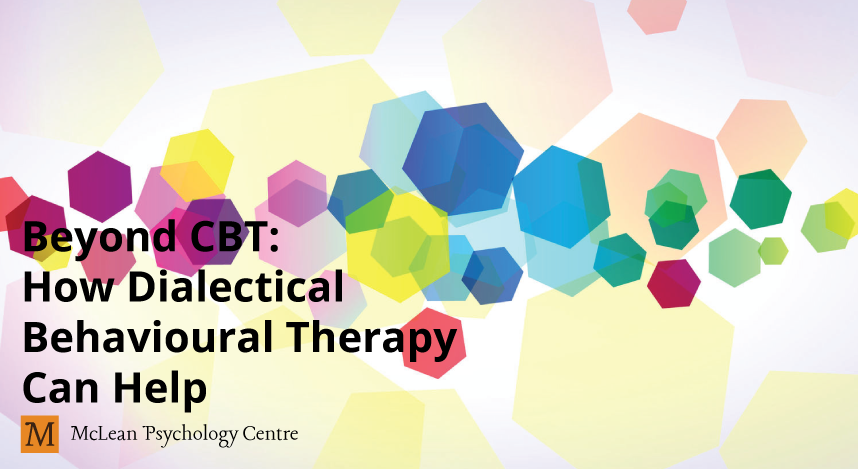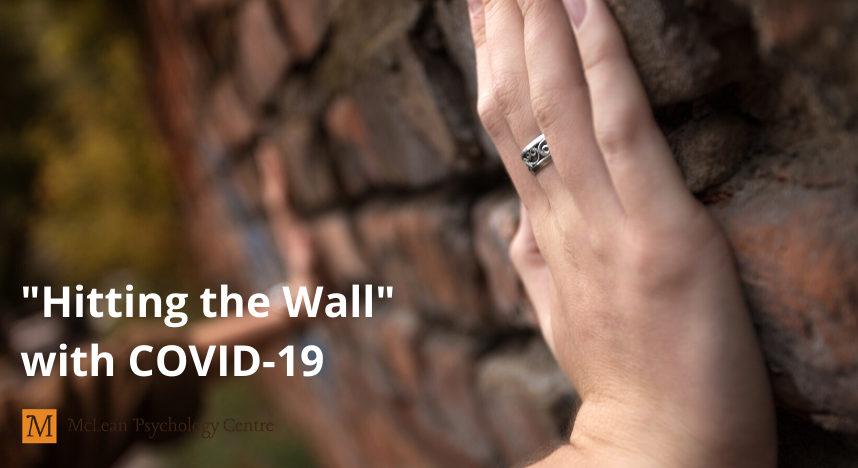Psychologists employ a number of treatments and techniques to assist their clients with issues or problems that may arise in their lives. Cognitive Behavioural Therapy is a common – and highly effective – treatment method in which thoughts are examined for their truth and validity before they manifest in negative emotions.
In some cases, however, an individual’s behaviour patterns are extreme and self-destructive and require a different, but similar, approach.
Dialectical Behavioural Therapy (DBT) is a type of Cognitive Behavioural Therapy that aims to treat those who are not seeing results from other treatment methods, or who may be deemed “difficult to treat”. “Dialectical” refers to the process of synthesizing opposite concepts such as change and acceptance in order to make changes to behaviour patterns.
In situations where we are upset or distressed, our bodies react instinctively. We can often find ourselves falling into repeating self-destructive behaviour patterns to help us cope.
Unfortunately, these patterns can lead to another form of self-destructive behaviour in which an individual is hurt or feels badly, so they do self-destructive things (such as self-harm, over-eating, or abusing drugs or alcohol), but then they also feel like a “bad” person for engaging in the self-destructive behaviours, which leads to feeling hurt or badly and beginning the cycle again.
DBT was originally created by Marsha Linehan in the 1970s to treat Borderline Personality Disorder – a disorder that causes unstable moods, behaviour, and relationships in which individuals have trouble regulating their thoughts and emotions – and those experiencing chronic thoughts of suicide, but DBT has since been expanded to treat other mental health conditions.
The therapy is support-oriented (helping an individual identify their strengths and build on them to feel better about themselves and their lives), cognitive-based (identifying thoughts, behaviours, and assumptions and reframing them in a less negative way), and collaborative (therapists and clients work closely together, but there will also be homework assignments, group therapy, role-playing, and skill practice, such as self-soothing).
Dialectical Behavioural Therapy has four important stages:
- Stage 1: People in this stage may be self-harming, may have attempted suicide, may have expressed a specific plan to end their lives, or have addiction issues. Therapy at this stage is focused on stabilization, including safety and crisis intervention in order to achieve control over problematic behaviours.
- Stage 2: With self-destructive behaviours under control, this stage focuses on past traumas and emotional pain in a safe environment. The goal of this stage is to address emotional pain rather than burying it.
- Stage 3: In this stage the goal is to help the individual begin to live a full life through building self-respect, setting goals, and finding peace and happiness. The focus is on trying to live life with ordinary happiness and unhappiness.
- Stage 4: In this stage, individuals are supported by their therapist to advance their lives by building on and improving skills learned in previous steps, with the goal being to help patients live happy and successful lives with emotional stability.
If you believe Dialectical Behavioural Therapy might be a good fit for you, McLean Psychology Centre can help. Book a consultation with one of our clinicians and discuss your options.
If you are currently having suicidal thoughts, please seek help immediately by going to the emergency room or calling 911. Hospitals have mental health crisis teams working out of their emergency departments and are best equipped to help you.







